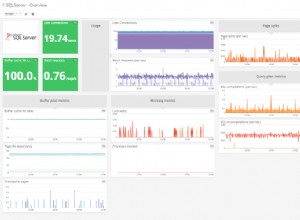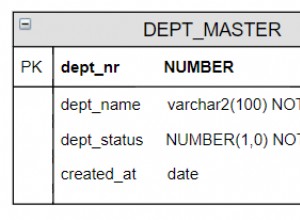Prova questo violino https://sqlfiddle.com/#!2/0a9c5/16 , codice sql sotto
SELECT c.rule_id, c.rule_title, GROUP_CONCAT(r.rule_title)
FROM RULES_TABLE AS c
LEFT JOIN RULES_TABLE AS r
ON r.parent_id = c.rule_id
WHERE c.parent_id IS NULL AND c.public = 1
GROUP BY c.rule_id
ORDER BY c.cat_position, c.rule_position;
omesso di proposito la php-izzazione del codice per mantenere l'evidenziazione della sintassi, che sembra non funzionare comunque
Se superi la dimensione massima consentita di group_concat, puoi aumentarla o utilizzare la versione seguente ed eseguire un po' più di elaborazione in php:
SELECT c.rule_id, c.rule_title, r.rule_title as r_rule_title
FROM RULES_TABLE AS c
LEFT JOIN RULES_TABLE AS r
ON r.parent_id = c.rule_id
WHERE c.parent_id IS NULL AND c.public = 1
ORDER BY c.cat_position, c.rule_position;
e in php, solo codice scheletro fornito, inserisci i valori effettivi, supponendo che tu usi pdo e che la tua pdostatement var sia chiamata $query :
$old_rule_id = null;
$rrt = array(); // will contain all r.rule_titles for a give c.rule_id
while( ($i = $query->fetch(PDO::FETCH_OBJ)) !== false ) {
if( $old_rule_id != $i->rule_id ) {
if( count($rrt) ) {
echo ... all the data for previous rule from $rrt ...
echo ... end of previous element ...
$rrt = array(); // empty it to collect new data
}
echo ... start of current element use data from $i->rule_id and $i->rule_title ...
$old_rule_id = $rule_id;
}
$rrt[] = $i->r_rule_title;
}
// the following is the same if from inside the while, minus reinitialization of $rrt;
if( count($rrt) ) {
echo ... all the data for previous rule from $rrt ...
echo ... end of previous element ...
}
sostituisci roba tra ... con codice valido




